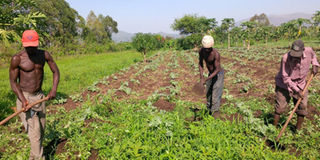Farm manager who quit job creates own model mixed farm

Byenkya employs workers to weed his garden. Right, some of the fruits of his labou; green pepper, lettuce and melon photo by Denis Bbosa
In June 2018, after working as a production manager in a farm based in Nakasongola District for five years, Solomon Byenkya quit his job to start his own farm in Pakanyi Sub-county, Masindi District.
The farm has now become a model for others within the region.
Inspiration
“While working in the farm, I was inspired by how much someone could earn from farming as I went around marketing produce and creating networking opportunities,” said Byenkya.
“In season, the farm earned Shs300,000 in profits daily from vegetable including cabbage, spinach, onions, tomatoes and pumpkins sales and this was a great motivation considering I was earning Shs1.5m a month and as such I realised I could earn more.”
Starting
Byenkya started his farming venture with four acres of land inherited from his father to plant lettuce, pumpkins and watermelon.
He bought watermelon seeds from East African Foods at Shs100,000, 100 grammes of lettuce seeds at Shs30,000 and 100 grammes of pumpkin seeds at Shs100,000.
Planting
He planted 5,000 seedlings of lettuce on a one acre of land and 6,000 seedlings of pumpkins on another one acre, 5,000 seedlings of watermelon on one acre and 4,000 seedlings of cabbage on the other acre. All these crops mature within a period of 50 to 60 days.
“At maturity, I harvested at least 200 kilogrammes of pumpkins three times weekly for a period of three months selling each pumpkin at an average of Shs3,500 at farm gate price. Lettuce on the other hand earned me Shs2,000 per kilogramme initially as I had not known the market well but afterwards this increased to Shs5,000 per kilogramme when I sold to an exporter,” said Byenkya.
Greenhouse
In December 2018, he used proceeds from the sale of the crops to develop a greenhouse which cost him Shs4m. In this, he planted Anna F1 hybrid tomato variety in which he harvested at least five kilogrammes weekly at maturity for a period of three months and sold the tomatoes Shs3,500 per kilogramme.
Expands
Since then, Byenkya has never looked back; he grows tomatoes, potatoes, kales, cabbages, passion fruits, watermelons, red and green pepper.
“Currently I have two acres of passion fruits, 400 heads of Chinese cabbages under cultivation, three greenhouses for production of tomatoes and pepper,” said Byenkya.
One of the greenhouses measuring 10m by 33m for instance is ready for transplanting of 1,500 plants of both red and green pepper which are currently in the nursery. He bought the pepper seeds at Shs100,000. From his one acre under watermelon cultivation, he expects to harvest 7,000 kilogrammes of the produce and anticipates selling each fruit at Shs3,000.
Market
“One of the biggest challenges I faced in my first season was identifying the right market, I sold to brokers who reduce the value by 20 per cent. However, I have now created linkages directly with my clients,” he said.
Byenkya also markets his produce on social media platforms such as Twitter, Facebook, WhatsApp and Instagram. He has more than 5000 followers across the pages. He also provides on-farm training on both greenhouse and open field horticultural production charging Shs25,000 per head per day. In this, active and prospective farmers get an opportunity to eat fresh passion fruits and also take home a five kilogramme bag of vegetables of their choice. He trains at least 10 farmers weekly.
Achievement
From his mixed farm, Byenkya bought a car three months ago at Shs10m. He uses the car to transport his produce to the markets in major towns helping him cut expenses.
Merits
It is combining two or more independent agricultural activities on the same farm.
A typical case of mixed farming is the combination of crop cultivation with dairy farming or in more general terms, crop cultivation with livestock farming.
Advantages
• Each and every product from the farms are properly used in a respected manner which leads to the maximum return from mixed farming business.
• Because of the fact that it is mixed farming, it gives you the opportunity to work the entire year.
• Mixed farming leads to efficient use of farming land, farming equipment and other major resources.




